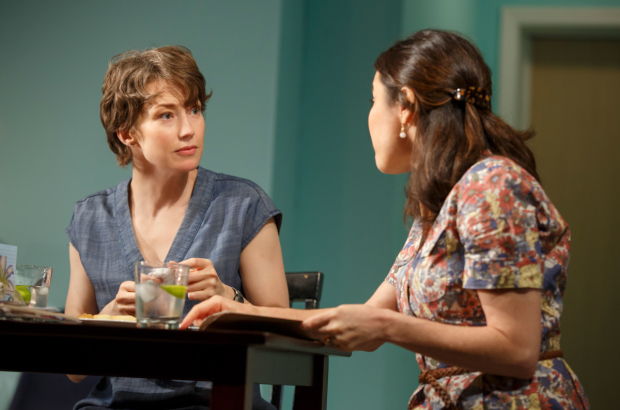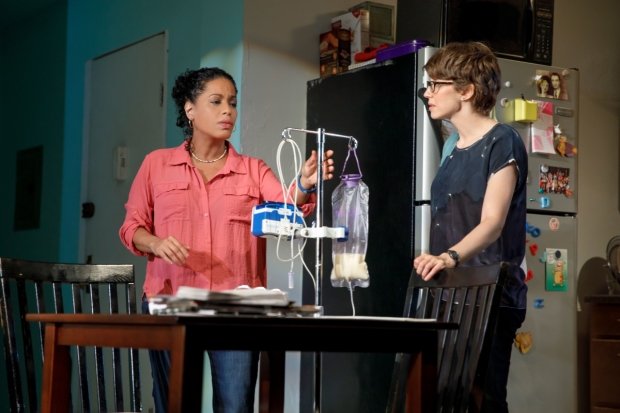Mary Jane

(© Joan Marcus)
When we first meet Mary Jane, the title character of Amy Herzog's emotionally overwhelming play at New York Theatre Workshop, it's in the tiny Jackson Heights apartment she shares with her son, Alex. On the surface, everything is pretty average: She's a single mom and a hard-working administrative assistant to a real estate developer. But normalcy is hard to achieve in her world, especially with a child like Alex who, at nearly 3 years old, has been sick so often this year that Mary Jane is out of vacation days, and it's only July.
Mary Jane is played with extraordinary grace by Carrie Coon, who has spent the last few years doing television work on shows like The Leftovers and Fargo, and is now making a very welcome return to the New York stage. Much like her deeply authentic performance, Mary Jane is perhaps the realest play we'll see all year, one that is precise in its details and is delivered with exceptional dignity by director Anne Kauffman.
In the first half, we're in Mary Jane's home, designed so realistically by Laura Jellinek that you can practically see the grease stains on the stove. Mary Jane's life gradually comes into focus in a series of two-person scenes. Her boyfriend left shortly after Alex's premature birth, and she's been raising her seizure-prone, uncommunicative son with cerebral palsy all on her own ever since.
Despite requiring a great deal of help with her son's issues, Mary Jane remains strong as hell in the face of hardship. She even takes the time to help people like Brianne (Susan Pourfar), a young mother entering the world of caring for a child with chronic illness, when she herself has no one to rely on beyond her building superintendent (Brenda Wehle), Alex's warm night nurse Sherry (Liza Colón-Zayas), and Sherry's inquisitive niece, Amelia (Danaya Esperanza). Mary Jane's stoic nature starts to crack when Alex's health takes a turn and the scene shifts to the Pediatric Intensive Care Unit.

(© Joan Marcus)
On the surface, Herzog is probing the idea of what it means to be a caregiver. But on a deeper level, Mary Jane is about one woman's journey to a particular kind of enlightenment, specifically the knowledge that when the most unfathomable thing happens, we have no other choice but to soldier on as best we can. In the play's later scenes, Herzog introduces us to a more spiritual world, one where Mary Jane attempts to find religious understanding through encounters with Chaya (Pourfar), a Hasidic woman whose daughter is ill, and Tenkei (the steely Wehle), a newly cloaked Buddhist nun.
Throughout, Herzog's delicate script is infused with lines and references that go beyond a writer's everyday understanding of the subject matter. The ornate little details of her script, which includes a very specific conversation about Ottobock adaptive strollers, pediatric standers, and the fact that Alex's doctor (Colón-Zayas) only refers to Mary Jane as "Mom," show that Herzog has examined every detail from the inside out (in real life, Herzog's daughter has cap myopathy, a muscular disorder). Kauffman, the theater world's most skilled purveyor of subtextual dread, skillfully keeps the mysterious tension slowly simmering under the surface. Her quiet, fluid staging is executed with such realistic lighting by Japhy Weideman that it feels as if the moon and streetlights truly are peering through apartment's windows.
This extreme naturalism extends to Coon's beautiful embodiment of the title character. She simply becomes Mary Jane, subtly and complexly blending her stoicism, sadness, and propensity for awkward humor into a performance that is entirely recognizable even if her world is completely foreign to us. The performance is so authentic that it absolutely hurts to watch.
Mary Jane is the kind of play that viewers need to bring tissues to, especially if they've lived through a situation similar to what's being depicted onstage. Though the ambiguity of the ending raises some question marks, the play tugs at the heartstrings without being manipulative in the way that so many dramas are. The show earns our sympathy, but the title character requires a different descriptor. Like so many real parents in her position, she can only be called one thing: a hero.

(© Joan Marcus)










